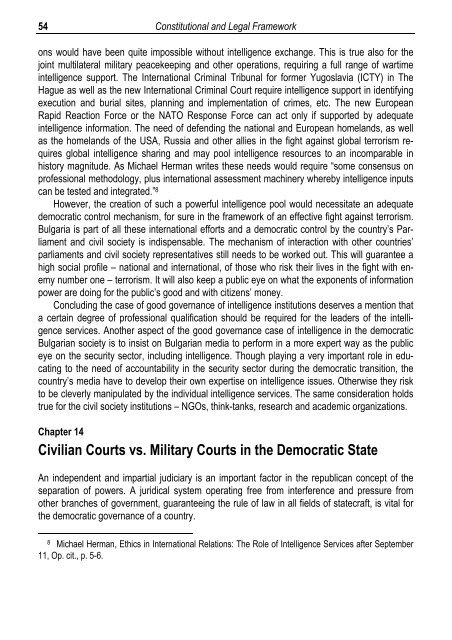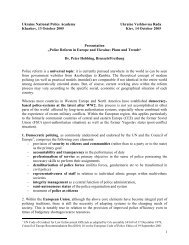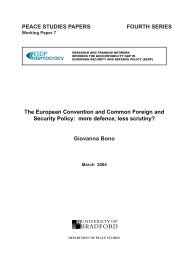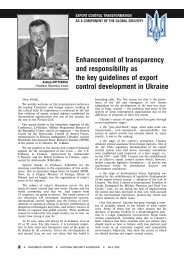Civil-Military Relations and Democratic Control of the Security Sector
Civil-Military Relations and Democratic Control of the Security Sector
Civil-Military Relations and Democratic Control of the Security Sector
Create successful ePaper yourself
Turn your PDF publications into a flip-book with our unique Google optimized e-Paper software.
54<br />
Constitutional <strong>and</strong> Legal Framework<br />
ons would have been quite impossible without intelligence exchange. This is true also for <strong>the</strong><br />
joint multilateral military peacekeeping <strong>and</strong> o<strong>the</strong>r operations, requiring a full range <strong>of</strong> wartime<br />
intelligence support. The International Criminal Tribunal for former Yugoslavia (ICTY) in The<br />
Hague as well as <strong>the</strong> new International Criminal Court require intelligence support in identifying<br />
execution <strong>and</strong> burial sites, planning <strong>and</strong> implementation <strong>of</strong> crimes, etc. The new European<br />
Rapid Reaction Force or <strong>the</strong> NATO Response Force can act only if supported by adequate<br />
intelligence information. The need <strong>of</strong> defending <strong>the</strong> national <strong>and</strong> European homel<strong>and</strong>s, as well<br />
as <strong>the</strong> homel<strong>and</strong>s <strong>of</strong> <strong>the</strong> USA, Russia <strong>and</strong> o<strong>the</strong>r allies in <strong>the</strong> fight against global terrorism requires<br />
global intelligence sharing <strong>and</strong> may pool intelligence resources to an incomparable in<br />
history magnitude. As Michael Herman writes <strong>the</strong>se needs would require “some consensus on<br />
pr<strong>of</strong>essional methodology, plus international assessment machinery whereby intelligence inputs<br />
can be tested <strong>and</strong> integrated.” 8<br />
However, <strong>the</strong> creation <strong>of</strong> such a powerful intelligence pool would necessitate an adequate<br />
democratic control mechanism, for sure in <strong>the</strong> framework <strong>of</strong> an effective fight against terrorism.<br />
Bulgaria is part <strong>of</strong> all <strong>the</strong>se international efforts <strong>and</strong> a democratic control by <strong>the</strong> country’s Parliament<br />
<strong>and</strong> civil society is indispensable. The mechanism <strong>of</strong> interaction with o<strong>the</strong>r countries’<br />
parliaments <strong>and</strong> civil society representatives still needs to be worked out. This will guarantee a<br />
high social pr<strong>of</strong>ile – national <strong>and</strong> international, <strong>of</strong> those who risk <strong>the</strong>ir lives in <strong>the</strong> fight with enemy<br />
number one – terrorism. It will also keep a public eye on what <strong>the</strong> exponents <strong>of</strong> information<br />
power are doing for <strong>the</strong> public’s good <strong>and</strong> with citizens’ money.<br />
Concluding <strong>the</strong> case <strong>of</strong> good governance <strong>of</strong> intelligence institutions deserves a mention that<br />
a certain degree <strong>of</strong> pr<strong>of</strong>essional qualification should be required for <strong>the</strong> leaders <strong>of</strong> <strong>the</strong> intelligence<br />
services. Ano<strong>the</strong>r aspect <strong>of</strong> <strong>the</strong> good governance case <strong>of</strong> intelligence in <strong>the</strong> democratic<br />
Bulgarian society is to insist on Bulgarian media to perform in a more expert way as <strong>the</strong> public<br />
eye on <strong>the</strong> security sector, including intelligence. Though playing a very important role in educating<br />
to <strong>the</strong> need <strong>of</strong> accountability in <strong>the</strong> security sector during <strong>the</strong> democratic transition, <strong>the</strong><br />
country’s media have to develop <strong>the</strong>ir own expertise on intelligence issues. O<strong>the</strong>rwise <strong>the</strong>y risk<br />
to be cleverly manipulated by <strong>the</strong> individual intelligence services. The same consideration holds<br />
true for <strong>the</strong> civil society institutions – NGOs, think-tanks, research <strong>and</strong> academic organizations.<br />
Chapter 14<br />
<strong>Civil</strong>ian Courts vs. <strong>Military</strong> Courts in <strong>the</strong> <strong>Democratic</strong> State<br />
An independent <strong>and</strong> impartial judiciary is an important factor in <strong>the</strong> republican concept <strong>of</strong> <strong>the</strong><br />
separation <strong>of</strong> powers. A juridical system operating free from interference <strong>and</strong> pressure from<br />
o<strong>the</strong>r branches <strong>of</strong> government, guaranteeing <strong>the</strong> rule <strong>of</strong> law in all fields <strong>of</strong> statecraft, is vital for<br />
<strong>the</strong> democratic governance <strong>of</strong> a country.<br />
8 Michael Herman, Ethics in International <strong>Relations</strong>: The Role <strong>of</strong> Intelligence Services after September<br />
11, Op. cit., p. 5-6.

















